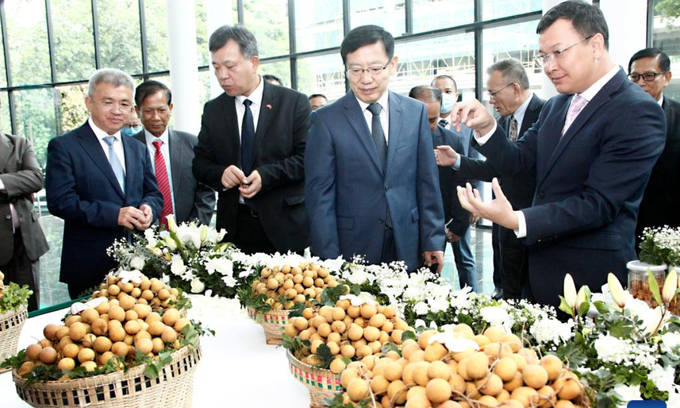June 4, 2025 | 17:21 GMT +7
June 4, 2025 | 17:21 GMT +7
Hotline: 0913.378.918
June 4, 2025 | 17:21 GMT +7
Hotline: 0913.378.918

Cambodian Minister of Agriculture, Forestry and Fisheries Dith Tina (1st R) and Chinese Ambassador to Cambodia Wang Wentian (2nd R) attend the launching ceremony of Cambodian longan export to China, in Phnom Penh, Cambodia, on Oct 27, 2022. Photo:Xinhua
Trade connections between China and Cambodia in ASEAN will accelerate with improving regional connectivity and lower trade barriers, as the "stronger-than-ever" bilateral friendship will benefit the people of both countries, despite rising uncertainty and instability in the world, experts said.
Apart from traditional cooperation areas such as agriculture and infrastructure, experts noted that 5G, artificial intelligence and smart cities can foster new drivers for trade in the ASEAN region, thanks to accelerated pace of digital economy transition.
At the invitation of Prime Minister Samdech Techo Hun Sen of Cambodia, Chinese Premier Li Keqiang will attend the 25th China-ASEAN Summit, the 25th ASEAN Plus Three Summit and the 17th East Asia Summit to be held in Cambodia from Tuesday to Sunday, and pay an official visit to Cambodia, Chinese Foreign Ministry spokesperson Zhao Lijian said on November 4.
Ahead of his official visit to Cambodia, Li on Monday called for a stronger China-Cambodia friendship and closer East Asia cooperation in a signed article published in Cambodian newspapers Khmer Times and Jian Hua Daily, noting that recent years have witnessed the continued growth of China-Cambodia relations.
"We need to strengthen complementarity between our development strategies, earnestly implement the Regional Comprehensive Economic Partnership (RCEP), drive our cooperation on the two wheels of regional trade and free trade, and work together to build an open regional economy," Li said in the article.
Cambodia is a small country in ASEAN but it is the one that has the closest partnership with China, with no unresolved political issues, not to mention that on many regional and international issues, China and Cambodia support each other and have a high degree of consensus, Zhao Gancheng, a research fellow at the Shanghai Institute for International Studies, told the Global Times on Tuesday.
Given the circumstances, cooperation between China and Cambodia is smooth, Zhao said, noting that their cooperation should be a model of cooperation between a big country and a small country.
Over the past few years, the China-Cambodia Free Trade Agreement was signed and came into force, and bilateral trade exceeded $10 billion, two years earlier than expected.
More than 170 companies from around the world have settled in the Sihanoukville Special Economic Zone, jointly developed by China and Cambodia, creating nearly 30,000 jobs for local people.
Moreover, in the infrastructure area, construction of the new international airport in Siem Reap is well underway. The expressway from Phnom Penh to Sihanoukville, the first of its kind in Cambodia, has been completed.
"I personally don't think there is any rush to sign new projects on the sidelines of Premier Li's visit to Cambodia. Since the post-pandemic era is gradually coming, there would be a focus on reviewing the projects that have been completed," Zhao said.
Zhao predicted that agriculture could be an area of further cooperation since the agricultural country is heavily dependent on China for its farm exports, and it may seek more exchanges in seeds and food safety.
In a fresh move on October 28, Cambodia launched longan exports to China, another instance of cooperation in the agricultural sector. Previously, high-quality rice, Basa fish, bananas and mangoes from Cambodia became readily available on the Chinese market and on the tables of Chinese households.
From 2019 to the end of June 2022, Cambodia exported 2.4 million tons of agricultural products to China, with a total export value of $1.942 billion, according to a report by the Xinhua News Agency, citing Cambodian Minister of Agriculture, Forestry and Fisheries Dith Tina.
In April this year, the agricultural ministries of the two countries held the second meeting of the China-Cambodia Steering Committee on Agricultural Cooperation, which clarified the key direction of agricultural cooperation.
There is also huge potential for both parties in terms of production capacity cooperation - that is, China's labor-intensive industries may invest in Cambodia and produce locally in Cambodia, Zhao said.
A prosperous trade connection between China and Cambodia will contribute to regional connectivity and economic recovery in the post-pandemic era, Wang Jia, an independent observer and a close follower of China-ASEAN relations, told the Global Times on Tuesday.
Chen stressed that the two countries can seize the opportunities created by new technologies, and strengthen cooperation in 5G and artificial intelligence.
"China will stand together with Cambodia and other countries in the region, and work together to build a stronger China-Cambodia friendship and closer East Asian cooperation," Premier Li said in the article.
(Global Times)

(VAN) Vikas Rambal has quietly built a $5 billion business empire in manufacturing, property and solar, and catapulted onto the Rich List.

(VAN) Available cropland now at less than five percent, according to latest geospatial assessment from FAO and UNOSAT.

(VAN) Alt Carbon has raised $12 million in a seed round as it plans to scale its carbon dioxide removal work in the South Asian nation.

(VAN) Attempts to bring down the price of the Japanese staple have had little effect amid a cost-of-living crisis.

(VAN) Fourth most important food crop in peril as Latin America and Caribbean suffer from slow-onset climate disaster.

(VAN) Shifting market dynamics and the noise around new legislation has propelled Trouw Nutrition’s research around early life nutrition in poultry. Today, it continues to be a key area of research.

(VAN) India is concerned about its food security and the livelihoods of its farmers if more US food imports are allowed.